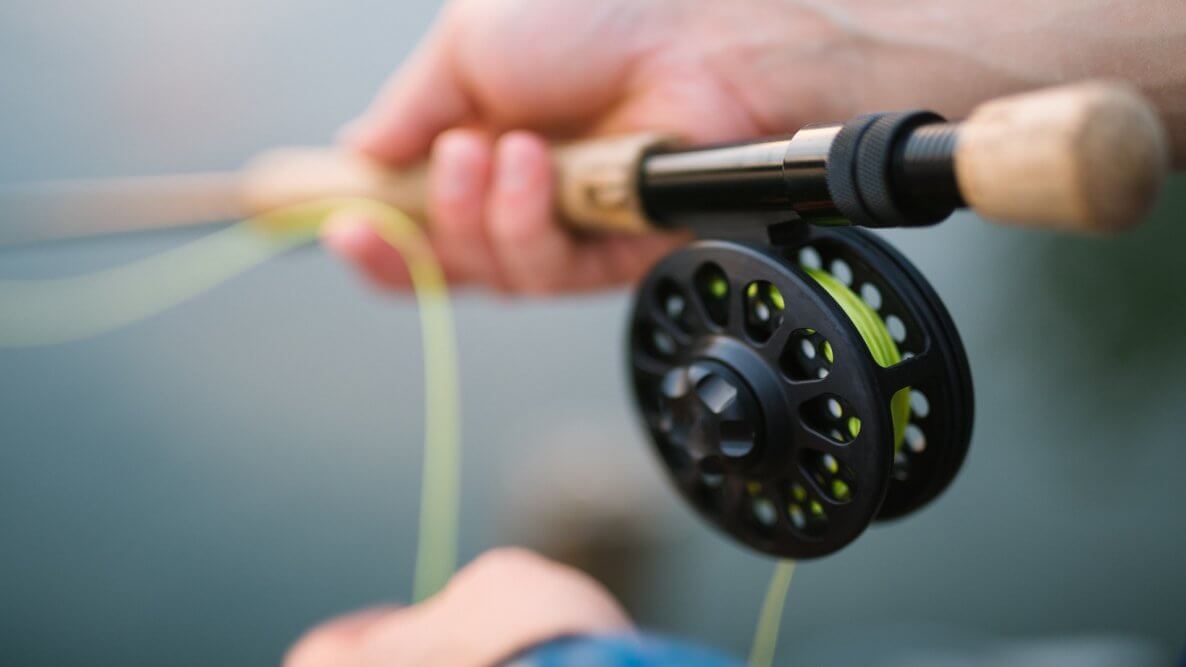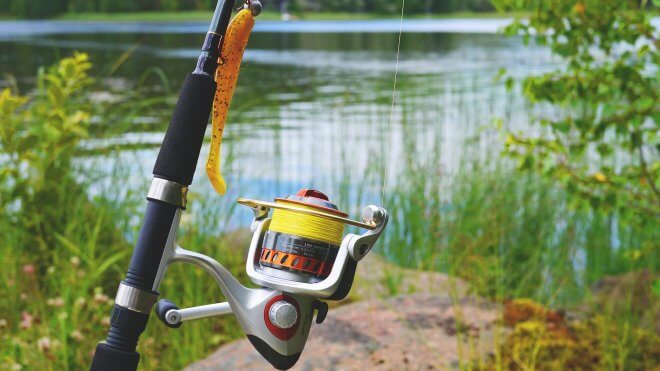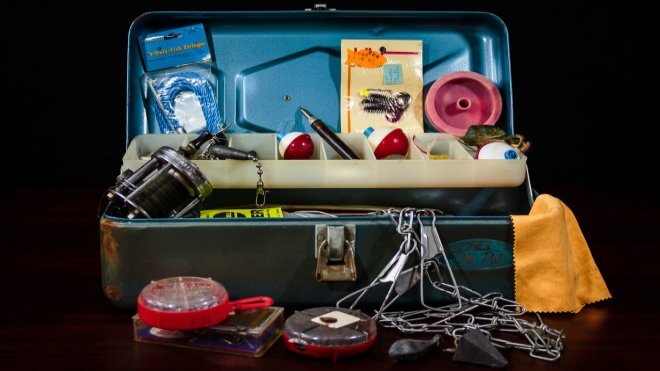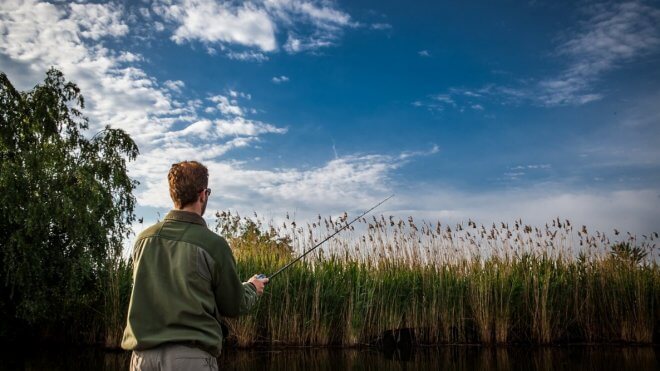Fishing is an incredibly fun outdoor pursuit enjoyed by many people across the globe. It offers a unique blend of challenge, strategy, excitement, and relaxation, all in a setting that allows you to get away from it all.

Fishing for Beginners: Fly Fishing Gear – Photo Courtesy: Carl Heyerdahl @ Unsplash
In a practical sense, the main challenge with fishing is getting started. There are different types of fishing, a huge amount of gear on the market, and a seemingly infinite amount of spots you can enjoy casting a line, all of which can make it really confusing for beginners. Therefore, in this article, we would like to outline a few strategies to making your introduction to fishing a lot smoother.
Practical Considerations
Before you head out to your local tackle shop, we recommend thinking about any practical considerations that could affect the gear you choose. For example, here a few suggested considerations:
- How often do you plan on fishing?
- Where do you plan to go fishing (e.g. locally, when traveling, a combination of the two, etc.)
- What is your budget?
- Will you primarily fish on your own, or do you plan you going with a group that is already set up?
These are just a few examples of things to think about before purchasing any new gear. It’s possible that you won’t have all the answers, and that’s fine, but simply thinking ahead can save you time and money in the long run.
Determining Your Budget
Determining an exact amount for your budget can be really difficult, especially if you’re not too familiar with all the costs of various pieces of equipment. Please see below for some tips that can help you gauge your budget and keep costs low when purchasing your gear. If you’re also planning a trip, check out this page.
Rod and Reel

Which Fishing Rod and Reel Is Better? – Photo Courtesy: Snufkin @ Pixabay
When looking for a new fishing rod and reel, keep in mind that you won’t need anything fancy at first. You will spend a lot of time learning the basics of fishing, as well as developing your own strategies and preferences for types of fishing, so focus on these first and upgrade your gear once you feel it’s necessary.
If you don’t know what rod you need, go with a spinning rod that has mid-range length and action. A spinning rod is a normal fishing rod that is capable of using a spinning reel, which is recommended for beginners.
This should be a rod somewhere around 8-9 feet with medium action, and you will be able to find a good starter rod like this for under $100. More information on choosing your first fishing rod can be found here.
For the reel, we suggest starting with a spinning reel. This is the most common type of reel and is used by both beginners and experts. Eventually, if you want to try something more advanced, you can then move on to a baitcasting reel.
You can find good spinning reels for fairly cheap (e.g. under $60), but make sure it’s a brand known for reliability, such as Shimano or PENN. For more tips about selecting the appropriate spinning reel for your needs, visit Flannel Fishermen.
Fishing Line
Not all fishing line is the same. There are various types of line you can buy, each of which differs in design and manufacturing process, which will affect how the line behaves in the water and when fighting a fish. Monofilament line, or mono line, is the most simple, cheap, and common type of fishing line. Better suited for fish in the 1-15lb range, it’s a bit more stretchy than other types of line.
Braided line is stronger and a little stiffer, so you lose less energy when setting the hook on a fish, but it’s a little more expensive. Braided line is usually better for heavier fish. Another type of line is fluorocarbon, but if you are just starting out, we wouldn’t worry about this one for now. Have a look at this guide to know more about the different types of fishing line with pros and cons for each type.
We highly recommend starting out with mono line especially since it is the cheapest. Another reason this is good for beginners is that it allows for good practice. You typically want to start fishing somewhere where there are more abundant fish populations, and this can often coincide with areas that have larger groupings of smaller fish; a perfect practice spot for beginners.
Tackle

Packed Fishing Tackle Box – Photo Courtesy: JamesDeMers @ Pixabay
This can be really confusing, especially if you’re staring at a wall full of lures at your local tackle shop. When first starting out, I personally find that less is better. I would recommend purchasing a couple packs of soft bait lures, for example, scented plastic worms, plastic leeches, plastic crawfish, etc. You’ll likely lose quite a few lures starting out, so these are a cheap way to start getting the feel for the casting, retrieval, and setting the hook when a fish bites.
In terms of artificial lures, the most common and versatile lures are crankbaits (aka “cranks”), spinnerbaits (aka “spinners”), spoon lures (aka “spoons”), and jigs. Try looking for simple colors that offer good contrast against the water. Black and white work well, or chartreuse on cloudier/muddier days. I’d suggest trying out each of these, but don’t buy a lot right away, as you want to get a bit of practice in first to find out what lures you really prefer.
Tackle is pretty cheap, but it adds up when you buy a lot at once. If you budget about $100 for yourself, then you can get a brand new tackle box filled with all the essentials, but you can also spend way less than that if you just want to try a couple different things out at first.
Safety
Last, but definitely not least, don’t forget about your own safety. Remember, often you’ll be fishing in isolation away from immediate access to amenities. Moreover, if you are in a place without cell reception, you need to be prepared. Here are a few cheap items to consider bringing along each time you go fishing:
- Water
- Non-perishable food
- Lighters or matches
- A knife
- Band-Aids, or gauze and tape
- Warm clothes
- Extra socks
- An emergency blanket (very small and easy to pack)
Practice Makes Perfect

Fishing for Beginners: Practice Makes Perfect – Photo Courtesy: Calin Pike @ Pixabay
Like any other sport, you will definitely become more successful the more you practice. With fishing, it’s really easy to get excited at the prospect of landing a beautiful trophy fish, but, in reality, this could take a little while to achieve. To get the hang of things quickly, try finding a local body of water that you can designate as your own practice facility.
Try fishing there at different times of the day, as well as casting from/to different areas on the water, and of course, try out different lures to see how the fish react. Combining research with your own hands-on experience will definitely allow you to become an experienced angler much more quickly, and before you know it, you will be posting pictures of yourself with some of your beautiful catches!
Final Thoughts
At the end of the day, as long as you are doing your research, thinking ahead, and trying to keep things simple, you should have an easy time getting started. It’s easy to get caught up in all the different types of gear and tackle, so try not get sold on all of the advanced items. If you stick with the goal of practicing on your local waters, you can always add to your repertoire later on as you begin to develop your own personal preferences for gear & fishing strategy. Good luck!
